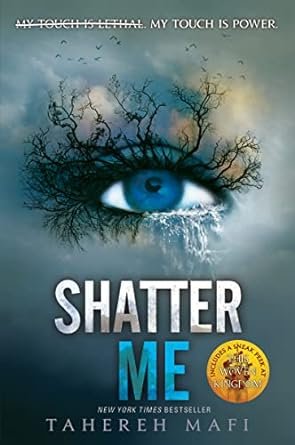Introduction to Shatter Me
“Shatter Me”, penned by Tahereh Mafi, serves as an electrifying inaugural entry to a captivating dystopian series. Set against a bleak, totalitarian world where societal collapse and environmental decay are rampant, the narrative introduces us to Juliette Ferrars. Juliette is a seventeen-year-old girl plagued by a unique and nightmarish power: her touch is lethal. This terrifying ability has led to her ostracization and imprisonment, making her both a pariah and a subject of fear and fascination.
The central plot revolves around Juliette’s struggle with her deadly gift, her quest for identity and belonging, and the potential redemption or destruction it might bring. The Reestablishment, a ruthless organization bent on control, seeks to exploit her power, drawing her into a complex web of manipulation and resistance. As Juliette battles her inner demons and external threats, readers are invited to navigate the murky waters between right and wrong, freedom and control.
What sets “Shatter Me” apart is Mafi’s unconventional narrative style, which embodies Juliette’s fractured psyche. The frequent use of strikethroughs, fragmented thoughts, and poetic prose serves not only as a unique literary device but also as a window into Juliette’s turbulent mind. These stylistic choices imbue the narrative with an immediate, raw, and intimate quality, making Juliette’s internal struggles palpable.
As the first book in a riveting series, “Shatter Me” lays a robust foundation for the unfolding saga. It deftly introduces a world filled with intrigue and potential, while Juliette’s journey of self-discovery and empowerment promises to captivate readers. This compelling blend of dystopian elements, a nuanced protagonist, and a fresh narrative style makes “Shatter Me” a noteworthy beginning to a transformative series.

Character Analysis and Development
Tahereh Mafi’s “Shatter Me” intricately weaves a tale of emotional depth and psychological complexity, primarily embodied through its protagonist, Juliette Ferrars. Initially, Juliette is depicted as a tormented individual, grappling both with her isolating power and her fear of inadvertently harming others. Her touch is lethal, making her a figure of mystery and fear, even to herself. This initial portrayal paints Juliette as a fragile character, ensnared in a web of self-doubt and societal rejection.
As the narrative progresses, Juliette’s interactions with the other main characters, notably Warner and Adam, play a pivotal role in her character development. Warner’s interest in her power shifts the dynamics, exposing her to thoughts of harnessing her abilities rather than fearing them. This complex and often antagonistic relationship with Warner ignites a transformation within Juliette, confronting her with moral dilemmas that challenge her perception of herself and her capabilities.
Simultaneously, her deepening bond with Adam offers a contrasting influence. Adam represents a semblance of normalcy and offers emotional support, fostering a sense of belonging and acceptance that Juliette has long been deprived of. Their relationship adds layers to Juliette’s development, presenting her with the possibility of love and human connection despite her destructive abilities.
Supporting characters also significantly influence Juliette’s journey. Each interaction peels back layers of her psyche, revealing a young woman steeled by hardship yet burgeoning with resilience. Her evolution from a reclusive, scared girl into a more self-assured individual ready to confront her fears is a testament to her inner strength. Themes of identity and power run deeply throughout the novel, as Juliette comes to terms with her unique gifts and strives to define herself beyond her abilities.
“Shatter Me” presents a compelling character study, emphasizing Juliette’s emotional and psychological struggles amidst a world that both fears and covets her power. Her journey is one of self-discovery, resilience, and the quest for agency, making Juliette Ferrars an unforgettable protagonist in a richly crafted narrative.
Themes and Symbolism
In Shatter Me by Tahereh Mafi, the narrative intricately weaves themes of control versus freedom, the struggle for identity, and the burdens of power. Through a dystopian lens, Mafi explores these timeless concepts, providing depth and richness to the story’s setting and its characters’ journeys.
The theme of control versus freedom is pervasive throughout the novel. Juliette, the protagonist, grapples with authoritative constraints imposed by the Reestablishment. Her desire for liberation, both physically and emotionally, mirrors the broader societal quest for autonomy. The contrast between restrictive societal norms and the yearning for individual freedom becomes a powerful drive in the narrative.
Another predominant theme is the struggle for identity. Juliette’s journey is one of self-discovery, as she attempts to understand her place in a world that views her as a weapon rather than a person. This internal conflict is accentuated through her isolation and her fear of her own touch, symbolizing her disconnect from humanity. The motif of touch serves as a poignant symbol throughout the book, reinforcing themes of alienation and the longing for connection.
The burdens of power are also a recurring theme in Shatter Me. Juliette’s ability to harm others with her touch elevates her to a position of uncanny power, and with it, immense responsibility. This theme interrogates the moral and ethical dimensions of power, how it can be both a blessing and a curse. Juliette’s evolving understanding of her abilities and the responsibility they carry speaks volumes about power dynamics in a dystopian society.
Symbolism in Mafi’s narrative is rich and thought-provoking, particularly with the recurrent imagery of touch and isolation. Juliette’s fear of touch not only underscores her physical alienation but also symbolizes her emotional and psychological barriers. This persistent isolation is a critical element that resonates with readers, highlighting the innate human need for connection.
These themes and the powerful symbolism in Shatter Me significantly enhance the dystopian genre. The exploration of control, freedom, identity, and power within a restrictive society offers readers a deeper understanding of the human condition and the complex interplay between individual and collective struggles.

Writing Style and Narrative Structure
Tahereh Mafi’s ‘Shatter Me’ is distinguished by its unique writing style and narrative structure, contributing significantly to its appeal. The primary characteristic of Mafi’s prose is its poetic and lyrical quality. This stylistic choice not only enriches the narrative but also deepens the reader’s immersion into the protagonist’s emotional landscape. Her use of metaphorical language and rhythmic sentences creates a hauntingly beautiful portrayal of Juliette’s turbulent psyche.
Central to the novel’s stylistic distinctiveness is the recurrent employment of strikethroughs. This particular technique is used to denote Juliette’s suppressed thoughts and internal conflicts, enhancing the portrayal of her mental struggles. By visually depicting Juliette’s hesitations and revising her thoughts in real-time, readers gain an intimate glimpse into her inner turmoil, affording a rare and authentic connection to the character’s vulnerabilities and resilience.
The narrative unfolds through a first-person perspective, further accentuating the intimacy between Juliette and the reader. This viewpoint ensures that readers experience the events closely, feeling Juliette’s every emotion, fear, and triumph. The first-person perspective is a powerful narrative device that not only grounds the reader in Juliette’s personal reality but also maintains a continuous engagement with her evolving character arc.
In terms of pacing, ‘Shatter Me’ balances a gradual buildup with moments of intense action, carefully orchestrating the plot’s progression to maintain tension. The novel commences with a slower rhythm, mirroring Juliette’s isolation, and gradually escalates as the narrative introduces new conflicts and alliances. This calculated tempo not only sustains suspense but also provides ample space for character development and thematic exploration.
Mafi’s strategic use of these stylistic choices successfully conveys the novel’s emotional and psychological depth. The lyrical prose, strikethroughs, and immersive first-person narrative collectively craft a nuanced portrayal of trauma and resilience, making ‘Shatter Me’ not just a story, but an evocative experience that resonates profoundly with its readers.






